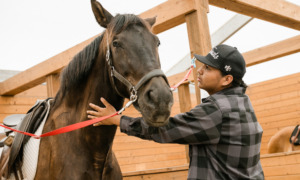 As a criminal defense lawyer and the mother of two girls, I have a very effective disciplinary tool at my disposal: I can take just about any undesirable interaction between my daughters and frame it as a crime. If the older one smacks the younger one, it’s an assault. If the younger one takes her big sister’s earrings, it’s larceny. If they are both yelling and shouting at each other, it’s disorderly conduct.
As a criminal defense lawyer and the mother of two girls, I have a very effective disciplinary tool at my disposal: I can take just about any undesirable interaction between my daughters and frame it as a crime. If the older one smacks the younger one, it’s an assault. If the younger one takes her big sister’s earrings, it’s larceny. If they are both yelling and shouting at each other, it’s disorderly conduct.
Over the years, I’ve been able to advise them that this behavior not only breaks the rules of our home but also violates North Carolina’s criminal statutes. As someone who defends children in juvenile delinquency court, I can also warn them that they could be criminally prosecuted and end up – as my young clients do – facing a judge and the possibility of a year of supervised probation, removal from their home, or long-term detention and commitment.
While these admonitions do give my daughters pause, they know – deep down – that the odds of any of this occurring are practically nil. But what separates my girls’ actions – which can readily be characterized as developmentally appropriate inappropriate behavior – from that of my clients? Sadly, I believe that it comes down to race, class and cultural status.
I thought about all of this recently when reading of 16-year-old Kiera Wilmot, a student with good grades and a perfect behavior record at Bartow High School in Bartow, Fla. In April, Kiera was expelled after mixing toilet bowl cleaner and aluminum foil in a two-liter bottle, causing a small explosion outside her school that hurt no one and damaged nothing.
According to the police report, when the assistant principal, Dan Durham, heard the noise, he approached Kiera, who explained that she was conducting an experiment for the science fair. After speaking with the science teacher, who knew nothing about the specific project, Durham contacted the police. An officer arrived, interviewed Kiera, and then called the prosecutors office. Assistant State Attorney Tammy Glotfelty advised the officer to arrest Kiera and charge her with two felonies: possession and discharge of a weapon on school grounds and discharging a destructive device. Kiera was taken to a juvenile assessment center and told she could ultimately be charged as an adult in criminal court.
How could this happen? How is it that several grownups – all professionals – made a series of decisions that led to the expulsion from school and criminal prosecution of a young person for an act that was nothing more than a teenage prank? The Polk County School District released a statement asserting that the incident was “a serious breach of conduct,” that students must learn “there are consequences to actions,” and that “[w]e will not compromise the safety and security of our students and staff.”
Although I was relieved to see that by the end of May, the prosecutor had agreed to place Kiera on a diversion plan (meaning that the criminal charges could ultimately be dimissed), what happened to this teenage girl is not an anomaly or an aberration. Ordinary misbehavior of children and adolescents – most of whom are black or brown – is regularly criminalized by school administrators as a result of zero-tolerance policies, implicit bias against racial and ethnic minorities, and disregard for the harsh collateral consequences of a criminal record. In addition to the stigma and humiliation suffered by Kiera, her opportunities for higher education and future employment could be significantly diminished by the way in which educators, law enforcement, and the justice system have handled the situation.
Would this have happened to my daughters – white, upper middle-class girls from a family of means? Would they have been summarily expelled and prosecuted for a childish prank that was inspired by mere curiosity? If not, what is it that separates them from Kiera Wilmot?
The school-to-prison pipeline is a very real phenomenon in the United States today. Until it is dismantled, we will continue to live in a society where the only logical answer to this question is skin color and socio-economic status. And that is not the world that I want for my children — or anyone’s.
Tamar R. Birckhead works as associate professor at the University of North Carolina School of Law.


























